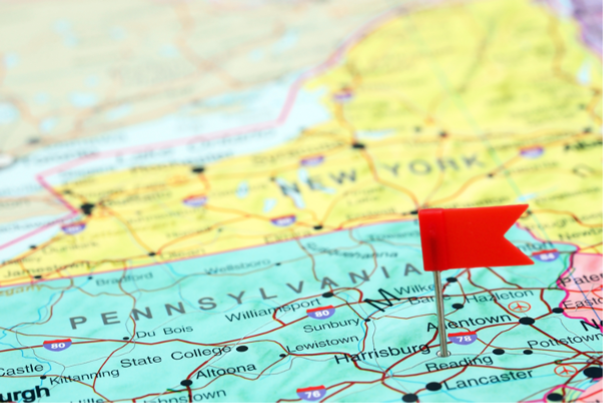Things Are Looking Up For The Keystone State: 7% Rise In Gambling Revenue In Ma
The revenue from sports betting and online casino apps contributed to this growth. On the other hand, the retail casino revenue experienced a decline.
Author:Frazer PughReviewer:Emmanuella SheaJul 07, 202362.9K Shares873.6K Views

Data released by the Pennsylvania Gaming Control Board revealed that the state’s gaming industry experienced significant growth in May, as both land-based and online operators raked in a total of $479.4 million in revenue, representing a slight increase of about half a percentage point compared to April’s figure of $476.6 million. Although May had an extra day due to its 31-day duration, on a per-day basis, the revenue was slightly lower than April, with May averaging $15.5 million per day compared to April’s $15.9 million.
Nevertheless, the year-over-year figures indicate positive growth for the state’s operators, consisting of 17 brick-and-mortar casinos and various digital extensions. The total revenue in May increased by 7.05% compared to the same period in 2022, with two segments of the gambling industry contributing significantly to the overall growth.
Sports Betting Revenue Experiences Double-Digit Growth
One of the key drivers of this growth was sports betting. While the betting handle remained relatively flat year-over-year, with $493.5 million in May 2022 and $495.6 million in May 2023, the hold percentage for sportsbooks experienced a significant boost, showcasing the market’s ongoing strength since its inception in 2019.
Pennsylvania’s sports betting revenue surged by 17.4% compared to the previous year, climbing from $35 million to $41.1 million, a significant rise from April’s $37 million, even amidst a lull in sporting events during that period. Meanwhile, the hold rate for May 2023, before promotional deductions stood at an impressive 11.6%.
FanDuelemerged as the market leader in Pennsylvania, with $192.5 million in online handle. DraftKings followed in second place, generating $132 million. BetMGM was next with $35.9 million, then Caesers came right after with $25.2 million, followed by Barstool Sportsbook ($20.2 million), and BetRivers ($19.3 million). The order of the top six mobile books remained unchanged from the previous month.
The ranking shifted slightly when considering gross taxable revenue after promotional credit deductions, and FanDuel’s dominance was even more pronounced. In fact, it again led the way with $22.3 million in gross taxable revenue. DraftKings secured the second position, with a turnover of $8.8 million, while BETMGM claimed a spot on the podium with $4.8 million in revenue. Barstool ranked fourth, accumulating $1.09 million, BetRivers followed with $1.05 million, and then Caesers scored just $398,000, below several smaller mobile sportsbooks.
The overall hold rate across Pennsylvania’s sportsbooks was similar to that seen in other states reporting in May, with all 17 states achieving holds over 10%. Among the neighboring states, New Jersey has the lowest hold thus far, at 10.6%.
Highest Surge Evident In Online Casino Revenue
The more substantial growth compared to May 2022 has been witnessed in the online casino sector, where 24.24% or $141m in revenue was recorded. As for no deposit slots, profits soared to 28.6%, or $100.6m, which is considerably higher than the figures recorded for online table games (17.3% to $37.9m).
Among the online operators, Hollywood Casinoat Penn National Race Course led the market with $58.4 million in revenue. It was followed by Valley Forge Casino Resort, which earned $29.5 million, and Rivers Casino, ranking third with $29.4 million. None of the other online operators in Pennsylvania surpassed $6 million in revenue.
Decline In Retail Casino Revenue
On the other hand, retail casino revenue experienced a 1.6% dip from April to May, despite the additional day of activity. The revenue dropped from $297.4 million to $292.5 million during that period. Year-over-year, retail slots revenue rose by 2.5% to $210.9 million, while retail table games revenue decreased by 7.8% to $81.6 million.
Parx Casino maintained its position as the top earner in slots revenue within the state, generating $33.9 million in May. Meanwhile, Wind Creek Bethlehem claimed the highest revenue in brick-and-mortar table games, amounting to $19.8 million.
In May, the state collected a total of $197.9 million in taxes from all forms of regulated gambling. The figure includes $60.8 million in tax revenue from iGaming and $14.8 million from sports wagering, highlighting the substantial financial contribution of the gaming industry to Pennsylvania’s economy.

Frazer Pugh
Author
Frazer Pugh is a distinguished expert in finance and business, boasting over 6 years of experience. Holding an MBA in Finance from Stanford University, Frazer's credentials underscore his authority and expertise in the field.
With a successful track record in executive roles and as a published author of influential articles on financial strategy, his insights are both deep and practical.
Beyond his professional life, Frazer is an avid traveler and culinary enthusiast, drawing inspiration from diverse cultures and cuisines.
His commitment to delivering trustworthy analysis and actionable advice reflects his dedication to shaping the world of finance and business, making a significant impact through his work.

Emmanuella Shea
Reviewer
Emmanuella Shea is a distinguished finance and economics expert with over a decade of experience. She holds a Master's degree in Finance and Economics from Harvard University, specializing in financial analysis, investment management, and economic forecasting.
Her authoritative insights and trustworthy advice have made her a highly sought-after advisor in the business world.
Outside of her professional life, she enjoys exploring diverse cuisines, reading non-fiction literature, and embarking on invigorating hikes.
Her passion for insightful analysis and reliable guidance is matched by her dedication to continuous learning and personal growth.
Latest Articles
Popular Articles